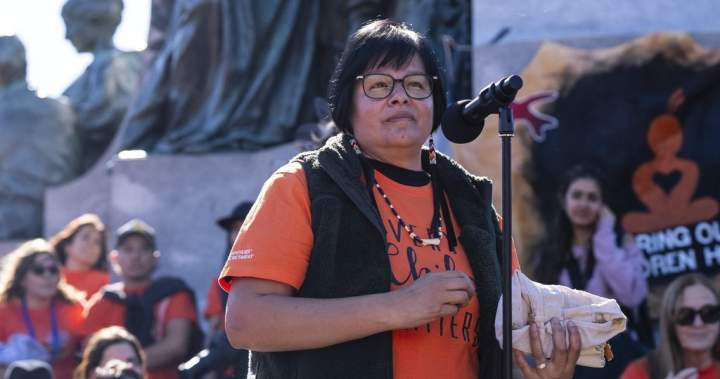MONTREAL – Fay-Lisa Gagné, who hails from Muskowekwan First Nation in Saskatchewan, has complicated feelings about the word reconciliation.
As a child she was placed into care with a francophone family in Quebec’s Eastern Townships, where she could only speak English. Her mother attended residential school, and her four siblings were lost to the 60s scoop — a period when governments in Canada oversaw the large-scale removal of Indigenous children from their homes to live with mostly with non-Indigenous caregivers.
And today, Gagné said, Indigenous children in Canada continue to be overrepresented in the country’s child welfare systems.
“We talk about reconciliation, but it’s hard to reconcile when you know about the politics of assimilation,” said Gagné, speaking from the National Day for Truth and Reconciliation gathering held in Montreal on Tuesday at Mount Royal park.
“And specifically when you lost your identity, your language, your culture by being adopted out.”
Gagné was among hundreds that came out to the event in honour of residential school survivors like her mother. She said she only got to reconnect with her briefly in 2007, before she passed away months later.
Related Videos
“A lot of negative events and violence happened in those walls,” she said about her mother’s experience growing up in a residential school south of Regina.
Get breaking National news
For news impacting Canada and around the world, sign up for breaking news alerts delivered directly to you when they happen.
“They were not allowed to speak their language. She lost it.”
Tuesday marked the fifth National Day for Truth and Reconciliation, a day created in recognition of Canada’s legacy of residential schools. About 150,000 Indigenous children were forced to attend the church-run, government-funded schools between 1857 and 1996. The institutions were often rife with abuse, unsuitable living conditions, and high rates of infections like pneumonia.
In 2015, Canada’s Truth and Reconciliation Commission concluded the residential school system had been created in an attempt to destroy and assimilate Indigenous people, an effort it characterized as “cultural genocide.”
Gagné said those legacies of assimilation continue across Canada’s child welfare policies. First Nations children are six to eight times more likely to be placed into care than non-Indigenous children, according to the First Nations Child and Family Caring Society.
Ka’nahsohon Kevin Deer said each Orange Shirt Day brings up feelings of sadness. The Canadian government tried to erase everything that makes Indigenous people who they are, their language, their creation stories, their songs, dances and history, he said, but it didn’t succeed.
“It’s the recognition of the atrocities our people have had to experience as a result of this attitude of superiority, that we’re going to kill the Indian to save the man,” said Deer, an elder from Kahnawake, a First Nation community south of Montreal.
But he said this day is also one that makes him feel hopeful. “We have all of this pain, but let’s learn from it,” Deer said. “Let’s put our best minds together to make it better, so that future generations can inherit a happy, safe, clean, beautiful, peaceful, loving home.”
Singer Leonard Sumner travelled from Little Saskatchewan First Nation in Manitoba to perform in front of the crowd. He said it’s important to honour the children that were taken away from their families. Many parents only had good intentions when their children were sent to residential schools, he said.
“We trusted. And we should not be punished for trusting,” he said.
This report by The Canadian Press was first published Sept. 30, 2025.
© 2025 The Canadian Press


